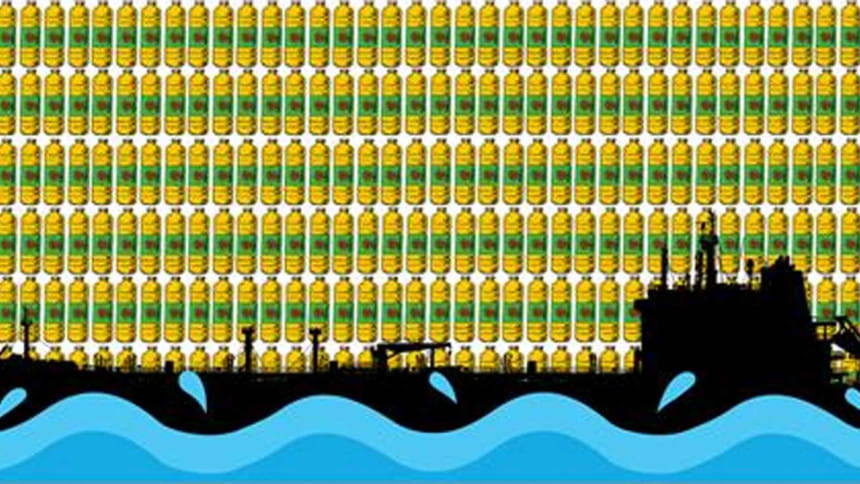Smugglers should not be rewarded

Bangladesh's struggle with smuggling is not a new phenomenon – gold, drugs, humans, money, fuel, and now edible oil. In February, a lighter vessel, Tanisha Enterprise, was seized on the Karnaphuli river by Chattogram zone river police, which was carrying 11,000 litres of smuggled unrefined edible oil for sale in the open market. The value of the seized edible oil is estimated to be around Tk 8.80 lakh. The unrefined edible oil had been transferred to the lighter vessel from a mother vessel at the outer anchorage, which was carrying shipment for an edible oil company. Twelve people had been arrested during the drive for failing to produce any valid documents. The lighter vessel belonged to Harunur Rashid, a Jubo League leader in Ward-39 EPZ area of Chattogram, who also happens to be one of the leaders of the smuggling syndicate and its mastermind, as reported by the media. Although he was initially implicated in the case, no action has somehow been taken against him, and he is walking the streets and even attending political events as if he was a responsible, law-abiding citizen.
This incident has once again brought to the fore the problem of smuggling of imported goods from the ports. In December last year, in Pashur river, Mongla, another such drive exposed the smuggling of diesel from a mother vessel. The coast guard seized 2,760 litres of diesel in a trawler and held some of the smugglers. Unfortunately, it was not the first time oil was being smuggled. The harbour authorities of the Mongla port had informed the media that every month 80 to 90 local and foreign ships arrive at the port with goods and commodities from abroad, and leveraging this opportunity, a strong syndicate of criminals smuggles goods and commodities from the ships.
The same thing happened in Chattogram port. And there as well, on a regular basis, imported goods and commodities are smuggled from ships. What is baffling is that, although these are "known" facts, the authorities have done little to catch the smugglers and dismantle the syndicates. Perhaps that is because the smugglers are powerful people operating under the patronage of influential quarters. Take the case of Harunur Rashid, for example. Although the ship belonged to him and was being operated by him, he was not arrested in the case. According to reports, he got bail.
This not the first time that smuggled goods have been seized from Tanisha Enterprise. In August last year, in the estuary of the Karnaphuli river, 13,000 litres of unrefined palm oil had been seized from the same vessel by officials of the Coast Guard East Zone. Later, when the case was handed over to customs, no action was taken. Apart from this, Harun stands accused in at least four cases filed with the Patenga and EPZ police stations – this daily reported citing police sources.
Now, the questions is, if Harun is such a big shot criminal, donned with so many cases, how is he allowed to get away with his crimes scot-free? Why is he not behind bars, or being interrogated to unveil the bigger picture about the smuggling syndicate he operates?
Moreover, the Directorate General of Shipping issued licence for Tanisha Enterprise as a sand barge. Then why are food items, oil and other goods being shipped using Tanisha? Did they not check its license? Perhaps they did, but let it continue its operations because of the political patronage its owner enjoys.
And this is only one aspect of it. Selling of smuggled goods in the open market is a different kind of problem altogether. Take the case of edible oil, for example. The market for commodities, especially edible oil, has been volatile for the last few months due to the ongoing international crises. And the common people are having to bear the brunt of it, because of a lack of supply of edible oil in the market and its subsequent spiralling prices. The business syndicates are being accused of hoarding edible oil to manipulate its prices, and police have seized thousands of litres of edible oil in multiple drives across the country. The smuggling of imported unrefined edible oil creates additional layers of impediment in the supply chain, which is likely to push prices further up. Moreover, when goods are brought into the country through customs, the NBR is able to generate revenue from them in the form of applicable taxes and customs duty. And through the VAT imposed on goods, revenue is increased. By selling smuggled goods in the open market, the smugglers are depriving the nation of revenue, and also creating an alternative supply chain which is outside the scope of the mainstream economy.
Unfortunately, the authorities seem to have lost sight of these facts, which is why they are allowing smuggling syndicates to operate without fear. In view of the repeated smuggling cases, the possibility of the various authorities – including the port authorities, coast guards, police, etc. – also being culpable cannot be ruled out.
The government should hold them accountable for their failure in stopping the smuggling and nabbing the criminals. Special drives should be conducted immediately to arrest the criminals. If political patronage is involved, then the patrons should also be brought to heel for their involvement. These smuggling syndicates should immediately be dismantled, before further wound is inflicted on the national economy.
Tasneem Tayeb is a columnist for The Daily Star. Her Twitter handle is @tasneem_tayeb

 For all latest news, follow The Daily Star's Google News channel.
For all latest news, follow The Daily Star's Google News channel. 





Comments